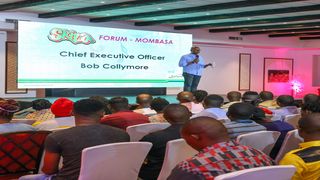
Safaricom CEO Bob Collymore at a Skiza event.
|Skiza tunes strike the right chord for artistes and mobile phone subscribers
What you need to know:
- Ring-back tones and call tunes keep callers entertained.
- They also create revenue streams for artistes who had been grappling with music piracy
- Content providers see room to improve payment terms to avoid conflict with intermediaries.
Skiza by Safaricom is definitely one of the biggest revenue earners in Kenyan showbiz. Despite the vicious wars between artistes and the platform, Skiza is still viewed by many as paying promptly, but there is a problem with Premium Rate Serve Providers (PRSPs) who act as intermediaries between the artistes and Safaricom. The PRSPs are believed to make much more out of each song an artiste signs to them than the amount the artiste takes home.
Skiza is essentially a ring-back tone or a call tune that allows subscribers to entertain callers with their favourite song instead of the traditional ring. Phone users like it for its functionality and the ability to customise their phone experiences, but the conflict between artistes and their intermediaries threatens to take the fun out of the tone.
Part of the blame has been directed to local artistes, with a faction holding that they do not do due diligence before they sign their songs to these PRSPs, thus ignorance leads a large number into signing contracts they do not understand.

Kenyan artiste Nonini.
Earlier, Safaricom used to pay the Skiza tune royalties to Collective Management Organisations (CMOs) — Music Copyright Society of Kenya (MCSK) Performers Rights Society of Kenya (PRISK) and Kenya Association of Music Producers (Kamp) — who then paid the artistes.
However, in 2017, a court ruling directed that Safaricom pay royalties from Skiza directly to content service providers (CSPs) who in turn will pay the artistes.
This was after two musicians, namely Mercy King’oo and Lydia Nyiva, moved to court claiming they were not part of CMOs and were not interested in joining. The upshot of the case was that the two complainants were being forced to receive their royalties through a CMO yet they had no dealings with it.
Safaricom started Skiza in 2009 and contracted PSRPs with the deal, stating that the content providers obtain all rights when giving content to the telco. Artistes claimed they have been making millions for these companies because there was no information or data provided to them on how much their songs were worth.
In 2017, Skiza announced that musicians would begin earning 30 per cent, up from the 22 percent they were earning per song. The amount would be paid through their respective CSPs who would then pay the musicians in accordance with the contracts they had signed, and in line with recent legal directives.
I believe artistes should deal with Safaricom directly.
Hubert Nakitare alias Nonini, who is also the acting chairman at Creatives Society of Kenya, followed the process keenly.
“I was directly involved in championing the rights of artistes that saw the increment of the percentage artistes get from Skiza. The biggest problem remains the CSPs, who receive money on behalf of artistes, because I believe artistes should deal with Safaricom directly without middlemen.
To sort out all this mess, says Nonini, a number of things need to be done. First, Safaricom should think of creating a platform where artistes upload their music without CSPs, who are simply brokers. YouTube has done it. The chain could retain the middlemen, but there but there should also be an option to sign up independently.
Second, Nonini says artistes should champion their rights through their various associations and demand a bigger cut. And, lastly, the government should reduce taxes on the money made from Skiza to ensure artistes end up with a fair share. “The government taxes Safaricom, then taxes the CSP, then the artiste’s PAYE (pay-as-you-earn). How is that even fair?” poses Nonini.
Safaricom charges Sh1 daily for Skiza and Sh1.50 for MySkiza, which is a platform where you can entertain yourself with your own ringback tone instead of listening to that of other subscribers.
“I’m signed under three PRSPs but one pays way better than the rest because it owns a media house, therefore advertisements of my music with the Skiza code are assured. As for the other PRSPs, they do little to market our content yet the cut is still the same. It’ll be hard for my fans to go to YouTube to get my Skiza codes as compared to waiting for the ads on TV,” reveals renowned Gospel musician and multiple award winner Guardian Angel.
Safaricom has provided easier ways to access music from local artistes, such that it’s searchable by the song or the name of the artiste once you dial *811#.
Furthermore, if you like someone’s Skiza tune when you call them, you can get it by dialing 11 while the song is playing. This has enabled more sales even without entering the code.
Each Skiza/MySkiza tune is automatically renewed daily at midnight at only Sh1 and Sh1.50, both locally and internationally.
In a bid to curb the PRSP-artistes wars, mostly due to a lack of transparency, Safaricom has presented artistes on the Skiza platform with an easy route. They can now keep track of their income on the platform by dialing *622# or by visiting the Skiza website.

Nameless.
With two decades of smash hits, Nameless is considered one of the GOATs of Kenyan urban music. Boniface Nyaga speaks with him on the highs, the lows and finding his true identity.
Boniface Nyaga: You’ve been in the game for 20 years. You do realise some of your fans were not even born you released Mega Rider
Nameless: Yes, it’s crazy when you meet an all grown-up man or woman who tells you he/she was in primary when we released Bomba. I have 19-year-old fans who were not even born when it came out, but they still vibe with it. Such things just help me look back and appreciate my journey, in fact, before Covid-19 hit I was hoping to do something big.
So what would you say has changed over the years?
At the onset I was driven by the passion to do great music, but now I am driven by purpose. My concern is what is my story, what will I be remembered for when it’s all said and done, and most importantly, how will that impact people?
You are really close with your children, how is it being a dad?
My daughter has made me appreciate psychology. She is as curious as I am. I am realising that most of her questions relate to emotional intelligence. Helping her with her homework has made me see that education needs to evolve. They are learning the same BODMAS that we did and to date I don’t see how it has helped me. You see, 80 per cent of our lives is relationships, whether its family, friends, business, employment, down to the guy who cuts your hair or your grass. How we handle the relationships in our lives is what determines our rate of success. In my view, psychology and emotional intelligence are the only subjects that should be made compulsory.
How has Covid-19 impacted you?
Covid-19 has been a blessing in disguise, because it has given me space to really reflect on my life and I am beginning to see that society doesn’t give us the right tools to succeed. It’s like society gives us maize flour and expects us to produce chapati, but when we fail the same society comes out to bash us. The only way out is to unlearn all the misconceptions that keep us down, and re-educate ourselves for success.
Your marriage is the envy of many, in a generation where divorce and breakups are so common, what’s your secret?
We had to unlearn a lot of toxic things that we were taught when growing up. Most of what we know and believe comes from what we were taught, whether intentionally or by observing those around us. Society has conditioned us to be alone, whether it’s the exam room, or religion that isolates us within our group, yet true success comes from team work. We often attract what we need, so to succesed in relationships you have to manage your differences so they are assets and not liabilities. For us, I am a realist while my wife is an optimist, so we see things very differently, but with time we have learnt that those differences are a actually a good thing. We all come into marriage with baggage but we are blind to our own load and very aware of our partner’s shortcomings, and that’s what destroys most marriages. A relationship is like a business; if you don’t have a single vision, mission and goal that everyone is working towards, it won’t work.
One of the biggest shifts in showbiz over the last 20 years has been the pay cheque. How did that happen?
My first corporate endorsement was the Zoe Girl promotion, and at the time companies didn’t consider entertainment a worthwhile investment. It took a while to figure out the whole thing, especially because companies were afraid of the controversy that comes with showbiz. The Internet also threw in some new dynamics, especially social media, but the industry has finally developed a mechanism that works so we are moving in the right direction. We were chatting with Bien (Sauti Sol artiste) the other day about how great it is to see young artistes making more cash much easier these days than we did, because it means the industry is growing. Look at Aziad (social media influencer) who popped up just a few months ago and already is cashing in on her brand.
What’s your advice to companies that still consider music a risky space?
Numbers don’t lie. Safaricom is the biggest company in East and Central Africa yet it is the biggest investor in the music sector. They have not just passively sponsored events and projects in the space but also made daring moves that forever changed the space. My first ever national concert tour was Kenya Live; I had never played with a band or participated in a professional concert production. It raised the bar not just in terms of payment, but also quality of performance and how an artiste should be treated. Skiza has also changed the game. It gives you access to more than 17 million people the minute your song is released. When it started piracy was killing us man, but at least with Skiza we have a fighting chance.



